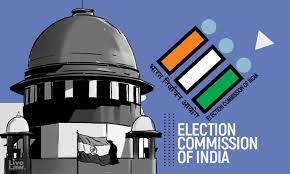
Procedure for selection of election commissioners in India
Procedure for selection of election commissioners in India
Important for Prelims:
Rajya Sabha, Election Commission of India, CEC and Other ECs (Appointment, Terms of Office and Conditions of Office) Bill, 2023, Article 324, 142 Law Commission, Public Interest Litigation (PIL), National and State Human Rights Commission, the Central Bureau of Investigation (CBI), Information Commission, Lokpal, Dinesh Goswami Committee on Electoral Reforms (1990), House of Commons, the Senate
Important for Mains:
GS-2: CEC and Other ECs (Appointment, Terms of Office and Conditions of Office) Bill, 2023, Constitutional provisions regarding selection of ECs,
18 December 2023
Why in News:
Recently, Rajya Sabha passed the Chief Election Commissioner and other Election Commissioners (Appointment, terms of office and conditions of office) Bill, 2023.
- It is likely to be enacted into a law after being passed by the Lok Sabha in the current winter session. It provides for the procedure for appointment of the Chief Election Commissioner (CEC) and the other two Election Commissioners (ECs).
CEC and Other ECs (Appointment, Terms of Office and Conditions of Office) Bill, 2023
Proposed Provisions
- The CEC and other ECs shall be appointed from persons who are holding or have held a post equivalent to the rank of Secretary to the Government of India.
- There shall be a search committee headed by the Minister of Law and Justice, who shall prepare a panel of five persons for consideration to the selection committee. The CEC and EC shall be appointed by the President on the recommendation of this selection committee consisting of the Prime Minister, the Leader of Opposition in the Lok Sabha and a Union Cabinet Minister to be nominated by the Prime Minister. It is for the first time that the Parliament is proposing a structured mechanism for identification of suitable persons for the post of CEC and EC.
- However, this bill removes the CJI from the selection process that was laid down in the Anoop Baranwal case.
Constitutional provisions regarding selection of ECs:
Composition:
- Article 324 of the Constitution of India provides for the composition of the Election Commission of India (ECI). It consists of CEC and two other ECs.
Provision:
- The Constitution provides that the CEC and EC shall be appointed by the President, subject to the provisions of any law made by Parliament. While existing parliamentary law provides for their conditions of service, it is silent regarding appointments.
- The appointments till date are made by the President, that is the Central Government and there is no mechanism for ensuring independence during the appointment process.
About the decision of the Supreme Court:
- A Public Interest Litigation (PIL) filed by Anoop Baranwal in 2015 pleaded for the Supreme Court to issue directions to set up an independent, collegium-like system for the appointment of the CEC and ECs.
- The Supreme Court in this case, in March 2023, held that there has been a legislative vacuum due to the absence of any law by Parliament in the last 73 years (since the adoption of the Constitution) with respect to the appointment of the CEC and EC.
- The independence of the ECI is essential for ensuring free and fair elections that is paramount for a vibrant democracy.
- The Supreme Court drew reference to various other institutions supporting constitutional democracy that have independent mechanisms for the appointment of its head/members like the National and State Human Rights Commission, the Central Bureau of Investigation (CBI), Information Commission, Lokpal etc.
- In the past, the Dinesh Goswami Committee on Electoral Reforms (1990) and the Law Commission in its 255th report on Electoral Reforms (2015), had suggested that the CEC and ECs should be appointed by a committee consisting of the Prime Minister, the Chief Justice of India (CJI) and the Leader of the Opposition or the largest Opposition party in the Lok Sabha.
- Considering these recommendations, the Supreme Court, exercising its powers under Article 142 (to issue directions for doing ‘complete justice’ in any matter), laid down that the CEC and ECs shall be appointed by a committee consisting of the Prime Minister, the CJI and the Leader of the Opposition or the largest opposition party in the Lok Sabha.
- It said that this mechanism shall be in place till Parliament enacts a law on this matter.
Status of selection of ECs globally:
- International practices for the selection and appointment of members to the electoral body vary between different democracies.
- In South Africa, the President of the Constitutional Court, representatives of the Human rights Court and gender equality are involved.
- In the U.K., the House of Commons approves the candidates, whereas in the U.S., the appointment is by the President and confirmed by the Senate.
Way forward:
- This Bill related to the EC appointment process should not be related to the decisions of the present government so that the selection process by the committee can be fair.
- The selection process prescribed by the Supreme Court should also be considered so that constitutional provisions are not ignored.
- The recommendations of various committees should also be considered before deciding the selection process.
- Although it is the prerogative of Parliament to make laws on the subject, it may be appropriate to retain the CJI in the selection committee to ensure utmost independence. However, there is every possibility that the bill will become law in its current form.
Conclusion:
It would be commendable and would instill considerable confidence in the public about the functioning of the ECI, if at least the selection under the new law is made by a unanimous decision by the proposed selection committee.
Source: The Hindu
------------------------------------
Mains Question
How effective will the key provisions related to the CEC and other EC (Appointment, Terms of Office and Conditions of Office) Bill, 2023 prove to be? review.